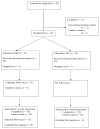Interpretation training in individuals with generalized social anxiety disorder: a randomized controlled trial
- PMID: 22250851
- PMCID: PMC3365642
- DOI: 10.1037/a0026928
Interpretation training in individuals with generalized social anxiety disorder: a randomized controlled trial
Erratum in
- J Consult Clin Psychol. 2013 Feb;81(1):74
Abstract
Objective: To examine the efficacy of a multisession computerized interpretation modification program (IMP) in the treatment of generalized social anxiety disorder (GSAD).
Method: The sample comprised 49 individuals meeting diagnostic criteria for GSAD who were enrolled in a randomized, double-blind placebo-controlled trial comparing IMP (n = 23) with an interpretation control condition (ICC; n = 26). The interpretation training procedures comprised a word-sentence association task in which participants decided whether a word implying a threatening or benign meaning was related to an ambiguous social scenario. In the IMP group, participants were reinforced for interpreting ambiguous social information in a nonthreatening and more benign manner. In the ICC group, participants were reinforced with equal frequency for interpreting ambiguous social information in either a threatening or benign manner.
Results: Intent-to-treat and completer analyses revealed that IMP significantly decreased threat interpretations and increased benign interpretations from pre- to post-assessment relative to the ICC group. Moreover, IMP participants displayed significantly larger reductions in clinician-rated social anxiety symptoms and functional impairment as well as self-reported trait anxiety and depression relative to ICC participants. Groups did not differ on change in self-rated social anxiety symptoms. Participants no longer meeting DSM-IV criteria for GSAD at post-assessment were 65% in IMP and 13% in ICC.
Conclusions: These results suggest that computerized interpretation training procedures may be beneficial for treating social anxiety disorder.
Figures
References
-
- Amir N, Foa EB, Coles ME. Negative interpretation bias in social phobia. Behaviour Research and Therapy. 1998;36:945–958. - PubMed
-
- Baron RM, Kenny DA. The moderator-mediator distinction in social psychological research: Conceptual, strategic and statistical considerations. Journal of Personality and Social Psychology. 1986;51:1173–1182. - PubMed


